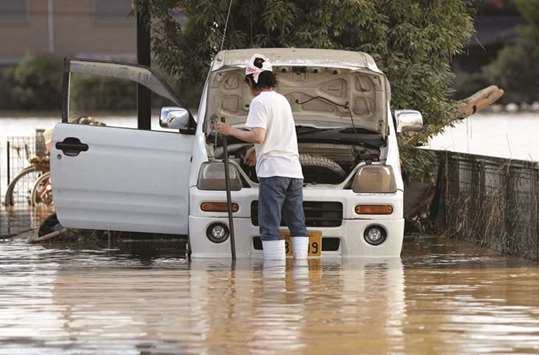The death toll from torrential rain and landslides in western Japan rose to 81 people yesterday, with dozens still missing after more than 2,000, temporarily stranded in the city of Kurashiki, were rescued.
Evacuation orders were in place for nearly 2mn people and landslide warnings were issued in many prefectures.
In hard-hit western Japan, emergency services and military personnel used helicopters and boats to rescue people from swollen rivers and buildings, including a hospital.
Scores of staff and patients, some still in their pajamas, were rescued from the isolated Mabi Memorial Hospital in boats rowed by members of Japan’s Self Defence Forces.
A city official said 170 patients and staff had been evacuated while public broadcaster NHK later said about 80 people were still stranded.
“I’m most grateful to the rescuers,” said Shigeyuki Asano, a 79-year-old patient who spent a night without electricity or water.”I feel so relieved that I am now liberated from such a bad-smelling, dark place.”
Kurashiki, with a population of just under 500,000, was among the hardest hit by rains that pounded many parts of western Japan, with the death toll exceeding the 77 killed in heavy rains and landslides in 2014 and the highest since a typhoon that killed 98 people in 2004.
Television footage showed a massive rescue operation, with 2,310 rescued in the city by evening, according to NHK, while search and rescue teams continued to look for others.
The overall death toll from the rains in Japan rose to at least 81 yesterday after floodwaters forced several million people from their homes, media reports and the Fire and Disaster Management Agency said.
Another 58 were missing, NHK said, and more rain was set to hit some areas for at least another day. The rain set off landslides and flooded rivers, trapping many people in their houses or on rooftops.
“This is a situation of extreme danger,” an official at the Japanese Meteorological Agency (JMA) told a news conference.
A three-year-old girl whose home was hit by a landslide in Hiroshima prefecture was found dead by a search team.
“It’s very painful,” said one elderly man watching nearby.”I have a granddaughter the same age. If it were her, I wouldn’t be able to stop crying.”
Japan’s government set up an emergency management centre at the prime minister’s office and some 54,000 rescuers from the military, police and fire departments were dispatched across a wide swath of western and southwestern Japan.
“There are still many people missing and others in need of help, we are working against time,” Prime Minister Shinzo Abe said yesterday morning.
Two sisters from an elementary school of just six pupils on the small island of Nuwa in Ehime prefecture were among the dead.
The younger, a first-grader, was a star and the hope of the depopulated island, the principal told NHK.
“It was such a sudden disaster, I just cannot come to grips with it,” the principal said.
Emergency warnings for severe rain in 11 prefectures — the most since a new warning system was introduced in 2013 — had been lifted by evening, but advisories for heavy rain and landslides remained in effect in many areas.
TV footage showed convenience stores with shelves mostly bare while elsewhere, residents lined up to receive water.
Some 276,000 households were without water supply, Kyodo said.
Roads were closed and train services suspended in parts of western Japan while Shinkansen bullet train services resumed on a limited schedule after being suspended on Friday.

A man checks a car in a flooded area in Mabi town in Kurashiki, Okayama Prefecture.
